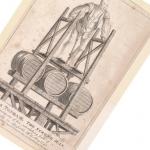 In fifth grade I learned that big kids could be dangerous. The nerdy kids in fifth grade, and dear reader I was born a nerd, decided that we would play at Greco-Roman mythology using a jungle gym as our cosmos: the top was Olympus and the bottom Hades. The big kids, for reasons I still did not understand, were offended with our happy play. They stopped our fun, because they were the Big Kids. By sixth grade, I got tired of it and did have one (in my mind) legendary fight and formed a club to protect the nerds. Oddly, I got in trouble with Junior High Adminstration for forming (I am not kidding) a gang and that was the end of that.
In fifth grade I learned that big kids could be dangerous. The nerdy kids in fifth grade, and dear reader I was born a nerd, decided that we would play at Greco-Roman mythology using a jungle gym as our cosmos: the top was Olympus and the bottom Hades. The big kids, for reasons I still did not understand, were offended with our happy play. They stopped our fun, because they were the Big Kids. By sixth grade, I got tired of it and did have one (in my mind) legendary fight and formed a club to protect the nerds. Oddly, I got in trouble with Junior High Adminstration for forming (I am not kidding) a gang and that was the end of that.
There are a multitude of things I learned from all of this, but one was that physical power should not be underestimated. Grownups forget that when you are a kid being powerful counts. Of course, grownups oft ignore the fact that being physically powerful goes on having advantages. My wife pointed out to me that in a crowd I am just over six feet tall and (overly) large. She is just over five feet and petite. It is not the same.
It is not.
Christian civilization compensates for a lack of physical power by elevating the (physically) weaker through laws and an emphasis on justice. Whatever the demerits of the rule, the idea of “women and children first” in a crisis at sea was a generalization that the physicallly stronger (in general) should not rush the lifeboats. Instead, they should defer to the physically weaker, because they are more likely to survive in physical peril.
We must never forget we are souls in bodies. The more civilized we become, the less we wish this mattered, and the more we try to equalize for all (including those with different physical capabilities.) The danger is forgetting that the physical always matters: I am always old and the young people could trample me.
The father of philosophy met a syncophant to the Establisment: Thrasymachus. The sophist told Socrates that the strong should rule. The older man, Socrates, tried to understand what Thrasymachus was saying:
First I have to understand you. What do you mean by saying that justice is the interest of the stronger? An athlete like Polydamas is far stronger than we are, and it is in his interest to eat great amounts of beef to keep himself in shape. You are not going to argue that we nonathletes have a like interest in such a diet or that it would be good for us to follow it?
Socrates, you are a buffoon. But though your methods are clumsy, you are effective enough in sabotaging other people’s arguments.
Thrasymachus makes a mistake. He assumed that “strong” obviously means physical strength. As an older man, why would he not think this? He is surrounded by strongmen and is an older man. He has legendary physical strength for his age, but he is not young anymore.
The younger and the stronger always think physical strength does not matter, because they revel in their youth and strength. Men (mostly, though not me) are stronger than (most) women and so think they need not consider size or power. We even make movies where we pretend (in CG!) that all is equal, as in same, so we need not worry. We create an equality that does not exist.
What is the answer?
That is beyond me, but I know this: we cannot ignore the body. The large, the strong, have power and only the tyrants, aided by educators like Thrasymachus, ignore this truth.
———————————————-
*I begin an informal summer reading of Republic using Scott/Sterling (a new translation for me). Part 1. Part 2. Part 3. Part 4. Part 5. Part 6. Part 7. Part 8. Part 9. Part 10. Part 11. Part 12. Part 13. Part 14. Part 15. Part 16. Part 17. Part 18. Part 19. Part 20. Part 21. Part 22. Part 23. Part 24. Part 25. Part 26.












